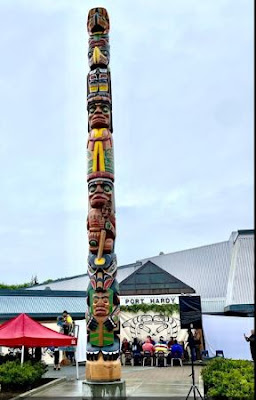National Day for Truth and Reconciliation in Port Hardy was especially meaningful this year. Not quite as many people joined the walk as in the previous two years, but there was still a good-sized crowd of both Indigenous and non-Indigenous people.
 |
| Totem pole at Port Hardy Secondary School |
Elders sit in the front row, and most non-Indigenous people wait to be invited to sit if they choose. The emcee always encourages everyone to sit; clearly they know that the settlers present don't want to presume. There are many families there, both First Nations and settler -- although not as many non-Indigenous children as I think should be there (as in, everyone).
After the ceremonies, elders are served lunch in their seats, and everyone is invited to partake. I've never stayed for food; it just feels wrong to me. I'm here to witness this catastrophic trauma in your community, now please feed me? I'm sure our Indigenous hosts would insist that I eat -- I've never been to a First Nations event that didn't include food -- but I don't feel right, so I don't. I also don't bring a camera or use my phone for photos or videos.
NDTR 2023
This year's ceremony included two pieces that were especially meaningful.
The emcee invited two people to the mic, people who are employed by Island Health, our health authority. I know them to be the director and manager of mental health and addiction services in our region.
The spokesperson from Island Health acknowledged the historic and systemic racism that caused Indigenous people to go without appropriate care, and the actions disguised as care that actively caused harm. They called all Island Health workers who were present (many of whom I recognized from my community connections) to come up.
As all stood facing the assembled crowd, the speaker apologized for these past wrongs, and pledged to move forward as partners with the Nations in timely, appropriate, and culturally safe care. They announced the opening of a new local health resource. It was a huge piece to witness.
Naturally, the emcee and the local chiefs talked about the residential "schools," and the impacts of intergenerational trauma. The speaker asked survivors of the schools to stand. Members of the Nation came out with brightly coloured blankets and wrapped each of them in a blanket, standing and holding these elders in a tight, blanketed embrace. It was deeply moving.
I recognized several regulars from our library. I knew they had been affected by residential school trauma, but did not know they themselves were survivors. I'm glad to know this about them.
Never assume
We left shortly after, stopping at a food truck for something to eat. There, I saw a lovely library customer I know, and her husband. She told me that he is Métis, and a residential school survivor himself. She told me she is also mostly First Nations, but her family somehow escaped this fate.
I didn't know this about her or her husband, and never could have guessed based on their appearance. This conversation was a perfect example of something I frequently encounter. You never know. You never know someone's background or their experience. You cannot make assumptions.
A few days later, at the library, I received an invitation that read, in part:
We invite you to celebrate with us and witness the cedar blessing of the opening of the Port Hardy Primary Care Centre's A’ekaḵila’as Room One—a welcoming, culturally-safe space for our Indigenous Community Partners, our patients and their families. We invite you to share with us how you see the space evolving over time. It is a meeting space, a place for care and a sacred space that we hope you will call your own.
This must be the health resource mentioned in the ceremony. There's an open house that I look forward to attending.
When I think about what Canada and the Church did to Indigenous people, I wonder how there can ever be justice, and I despair. And when I witness the spirit and resiliency of the Nations and their peoples, and I connect with all the non-Indigenous people who want to help the healing, I have hope.

No comments:
Post a Comment